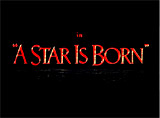
|
A Star
is Born (1954)
In director George Cukor's dramatic musical and classic
tearjerker - it was a superior remake of William Wellman's
non-musical, classic 1937 film of the same
name starring Janet Gaynor and Fredric March that was inspired by What
Price Hollywood? (1932) also directed by Cukor. [Note: It was also
updated to modern times twice as a musical drama - first as A Star
Is Born (1976) with Barbra Steisand and Kris Kristofferson, and second
as A Star Is Born (2018), starring director/actor Bradley Cooper
and Lady Gaga.] The emotionally-intense psycho-drama also hinted
at the real-life troubles and problems (five marriages) in the
career of its female star - Judy Garland - a victim of the Hollywood
studio system - during the film's making; it was Garland's comeback
and self-referential film (after she had been dismissed from her
lead role in MGM's Annie Get Your Gun (1950) for health
problems), and then suffered from alcoholic binges and suicide attempts:
- during a late-night gala
benefit "Night of Stars" held at Hollywood's Shrine Auditorium,
boozing, womanizing, brilliant, but fading alcoholic movie actor Norman
Maine (James Mason) lurched onstage during a
song and dance act being performed by young,
aspiring newcomer-star actress and vocalist Esther Blodgett (Judy Garland)
with the Glenn Williams Orchestra; he made a drunken spectacle of
himself in front of the audience before she saved him from major embarrassment
and led him off the stage as the audience applauded
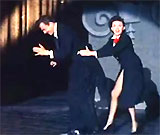
Esther Awkwardly Dancing on Stage with Norman at Shrine
Auditorium's "Night of Stars"
|
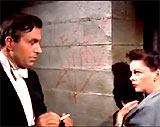
Backstage - Norman Drew a Heart on Wall with Esther's Lipstick
|
- still inebriated but thankful to Esther for saving
him, Norman drew a heart with an arrow through it and their initials,
using her lipstick on one of the backstage walls; Esther politely refused a dinner date with
him
- later that night after being haunted
by Esther's memory, Norman tracked her down and found her in an
empty, after-hours Sunset Strip musicians' hangout (the Downbeat
Club with stacked chairs all around); he became transfixed as he
watched her sing the memorable torch song blues/ballad classic: "The
Man That Got Away," accompanied by her pianist Danny McGuire
(Tommy Noonan) - the performance was a classic, three and a half-minute
uninterrupted camera take
- Norman was impressed by her star quality and
spark of genius; as he drove her home, she told him her life story,
ending with: "I somehow feel most alive when I'm singing"; at her single apartment,
Esther dreamt of having a lucky break, being discovered by a record
company talent scout and having a number one hit song; Norman advised
her to give up her small-time band for a chance at a movie career: ("Don't settle
for the little dream. Go on to the big one"); he gave her some final
words of encouragement before he left: "Don't ever forget
how good you are. And hang on to that. Because I'm right." And
then, he delivered his trademark farewell words to her, repeated
later in the film: "I just want to take another look at you"
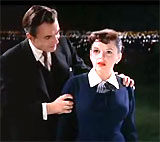
Words of Encouragement to Esther: "Don't ever forget how good you are"
|
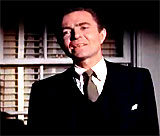
|
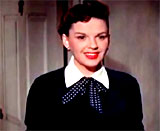
|
|
Norman: "I just want to take another look at you"
|
- afterwards, with hopes of getting a screen test,
Esther dreamily envisioned her future success as recommended by
Norman: ("He saw something in me nobody else ever did. He made
me see it too. He made me believe it"); Esther told her pianist
Danny that she was not going to Frisco with the band the next morning,
and that she was determined "for a chance at being something,
something bigger than I ever dreamed of" - a screen test
- she took Norman's advice
and dropped her band - but immediately became unemployed when Norman
unexpectedly left town for a movie shoot; Esther was forced to
work singing in TV commercials and as a car-hop waitress at a burger
drive-in
- weeks later, Norman reunited with Esther and was
able to get her a screen test at his studio; she was hired as
a contract bit player at the Oliver Niles (Charles Bickford) Movie
Studio, although she was treated as another one
of Maine's conquests; Norman intervened and refused to have her
look changed - with a blonde wig and nose prosthetic; however,
she realized that the studio had given her a new screen name when she
received her first paycheck - VIcki Lester; her 'big
break' into show-business came when she advantageously took the lead
singing role in a musical comedy when another singer canceled out
of her contract
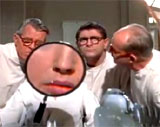
Studio Make-Up Artists Examining Esther's Face
|
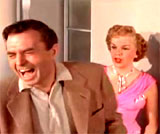
Norman Laughing at Her Hideous Studio Make-Up
|
- her debut lead film role, seen in the film's preview
screening (a 'movie within a movie') was during a special showing
in which Norman's new film Another Dawn was also being previewed;
she performed in the film's most extravagant and 18-minute main production
sequence - one of the finest and most distinctive musical film sequences
ever made, opening and closing with "Born in a Trunk";
it was presented as Esther's career success story in the form of
an exquisitely-staged musical "biography" of
her character beginning with her family's vaudeville performance as
one of 'The 3 McCoys', and her rise to stardom as Vicki Lester; she
commented on being a "ten-year-overnight
sensation," singing such classics as "I'll Get By (As Long as I Have You)," "You
Took Advantage of Me," "Black Bottom," "My Melancholy
Baby," and "Swanee"
(in a minstrel-like performance, wearing a man's hat and suit)
|
Medley of Songs in the "Born in a Trunk" Production Number
|
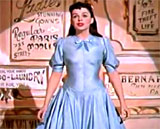
"I'll Get By (As Long as I Have You)"
|
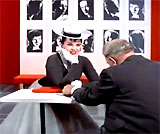
"You Took Advantage of Me"
|
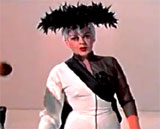
"Black Bottom"
|
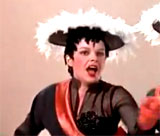
"Black Bottom"
|
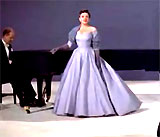
"My Melancholy Baby"
|
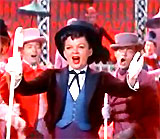
"Swanee"
|
- Vicki's film debut was a sensational success, compared
to the lukewarm reception that Norman's film received; her singing
career was launched and on the rise in Hollywood, while his popularity
was in reverse and on the decline; he told her: "It's all yours,
in more ways than one...You're going to be a great star, Esther. Don't
let that change you too much. Don't let it take over your life"
- Vicki sensed Norman's awareness that he destroyed
everything to which he got close: ("I destroy everything
I touch. I always have. Forget me. I'm a bad lot"), and he wanted
to get out of their relationship, but she refused to give up on him,
hugged him, and told him that he should believe that it wasn't too
late: "It's not too late. Not for you, not for me"
- during the playback of her singing "Here's What I'm
Here For" after a studio recording session, Norman's marriage
proposal was caught on the audio - she accepted his "public" proposal,
and after they left, the studio's publicity
director Matt Libby (Jack Carson) commented that Vicki was walking
into a "booby trap"; however, studio head Niles felt marriage might benefit
Norman: "This might make the difference to Norman"
- they were wed in a very secretive
and small justice-of-the-peace ceremony in San Verdo township in LA
County, contrary to the wishes of publicist Libby who had wanted
to orchestrate a major studio wedding; they experienced an idyllic
honeymoon (in a cheap motel), where after hearing her singing the
number one hit song on the radio, "It's a New World," Norman
asked for a private listening session with Vicki - one of the film's
most tender moments
- their marriage was soon tested
by the tragic consequences of Norman's personal self-destruction,
disintegration and loss of fame; Norman was confronted by Niles,
the head of the studio, who took him aside and informed him that
the rest of his contract would be bought up and paid off; Norman was
to be dropped at the studio, because he had become too big a risk,
lapsing in his screen performances due to his alcoholism: "They can't
afford you any more, Norman. You're too big a risk. Those big, fat
lush days when a star could get drunk and disappear and hold up
production for two weeks are over. Even if you hadn't slipped a little,
they still wouldn't take the chance. Your record's too bad. No one
can afford it any more. Things are too tough"
- Norman soon realized
how much attention Vicki was receiving and how much the public
had already forgotten him; his career toppled while he remained at
home waiting for screen roles, playing solitaire and putting golf
balls, as Vicki spent her long days at the studio; when Vicki returned
one night late from rehearsal, she performed her most recent production
number for him, "Someone at Last"; a deliveryman at the door
interrupted with a package and asked: "Who are you?...Sign right
there, Mr. Lester"; soon after, Norman told
Vicki: "I think I shall mix myself a drink"
- his alcoholism would increase and his marriage began to unravel
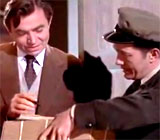
Deliveryman: "Sign right there, Mr. Lester"
|
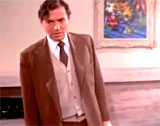
Norman: "I think I shall mix myself a drink"
|
- in a classic sequence at the annual Academy Awards
Banquet Ceremony (in the Cocoanut Grove at the
Ambassador Hotel), Vicki won the Best Actress Academy Award Oscar
(for A World For Two) and was giving her acceptance speech, when the
drunken Norman made an intrusive entrance and interrupted Vicki's
speech; while stumbling around, he delivered his own self-pitying
speech to demand recognition from the audience: "Congratulations,
my dear. I made it just in time, didn't I? May I borrow the end of
your speech to make a speech of my own? My method for gaining your
attention may seem a little uncon-unconventional, but, uh, hard times
call for harsh measures. My - I had my speech all prepared, but I
- it's gone right out of my head. Let me see - why, it's silly to
be so formal, isn't it? I-I know most of you sitting out there by
your first names, don't I? I made a lot o' money for you gentlemen
in my time through the years, didn't I? Well, I need a job now. Yeah,
that's it. That-that-that-that's the speech. That's the - I need
a job. That's what I wanted to say. I - I need a job. It's as simple
as that. I - I need a job, that's all. My talents, I may say, are
not confined to dramatic parts. I can play comedy, too"
- Norman was gesturing wildly on stage and accidentally slapped her when
he flung his arm out and struck her; hiding her embarrassment, Vicki
laughed, brushed her tears aside, and helped him off the stage to
her table; soon after, Norman was admitted to a sanitarium for treatment
of his alcoholism
- during a break in filming after
Vicki's singing and dancing of "Lose That Long Face," she
experienced a confessional breakdown in a dressing
room scene with studio head Oliver Niles about her despair and concern
over her alcoholic husband Norman: "What is it that makes him
want to destroy himself?...You don't know what it's like to watch
somebody you love just crumble away bit by bit, day by day, in front
of your eyes, and stand there helpless. Love isn't enough, I thought
it was. I thought I was the answer for Norman. But love isn't enough
for him....Sometimes, I hate him. I hate his promises to stop, and
then the watching and waiting to see it begin again. I hate to go
home to him at nights and listen to his lies...I hate me cause I've
failed too...All he's got left is his pride"; Niles suggested
that he would try to help Norman get work again; afterwards, she
forced herself to go back on stage to film the scene again
- after Norman's discharge months later, he spent some
of his spare time at the Santa Anita Race Track; Norman's
initial efforts to sober up were promising; however, at
the bar while drinking ginger ale, his old adversary Libby insulted him
and provoked a fight by accusing him of living off Vicki's earnings:
("You got yourself fixed nice and comfortable, you got no complaint.
You can live off your wife now"); Norman was knocked to the floor,
and humiliated when he heard onlookers
comment: ("Drunk again. He's been drunk for years") - it provided
him with an excuse to continue drinking, and he changed his drink from
ginger ale to a double scotch
- Norman disappeared and went on a monumental
drunken binge, was scandalously arrested four days later, and in a
night court was sentenced to jail for 90 days for drunkenness: ("Drunk
and disorderly. Crashed car into tree at Sunset and Coronado. Evidently
been drinking for days. Resisted arrest and injured one of the arresting
officers"); with Vicki's intercession, the sentence was suspended,
and Norman was placed in her custody; Vicki was willing to sacrifice
her career to help her husband regain his stability and sobriety;
she brought him back to their Malibu home
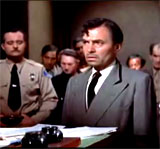
Norman Sentenced in Night Court For Menacing Drunkenness
|
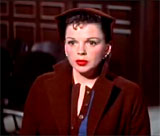
Vicki Given Custody of Norman by the Judge
|
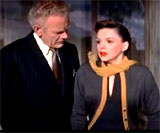
Vicki's Decision with Niles to Quit the Business and
Take Care of Norman
|
- still unreasonably but faithfully hopeful, Vicki (at
the height of her own career) told Niles that she planned to quit
Hollywood so that she could go away for good and take care of him,
to restore his health; Norman overheard their conversation and couldn't
believe his ears; in anguish and with a look of agonizing self-loathing,
he buried his face in his pillow
- in the film's shocking, tragic but inevitable
sequence, he made one last request that Vicki sing a song for him
from the kitchen window: "It's a New World" - and he also
asked for one final look at her: "Hey
- I just wanted to look at you again"; and then Norman walked
into the ocean from his Malibu beach house at dawn -
to commit suicide by drowning himself; Norman's
stunning suicidal demise was inevitable, although it was reported as
an "accidental drowning"
- in the film's memorable conclusion, one of the greatest endings of any movie
in the 1950s, Vicki was persuaded by her studio
accompanist Danny McGuire to come out of mourning
to perform and keep Norman's memory alive; he escorted her to show
up and sing at a scheduled Shrine Auditorium benefit concert; she passed
by the backstage wall with the heart and arrow drawn in lipstick by
Norman so many months before (E.B. & N.M.);
in front of the curtain, the emcee (Rex Evans) was announcing that
she would not be appearing, but after receiving a whispered message
from Danny, he then excitedly announced: "Vicki
Lester will appear tonight!"
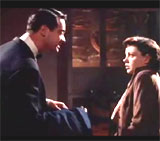
Danny's Encouragement to Vicki to Keep Norman's Memory Alive
|
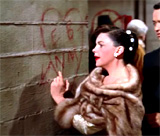
Backstage at the Shrine Auditorium - Vicki Remembered
the Heart Drawn on Wall (With Her and Norman's Initials)
|
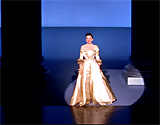
Vicki's Unexpected Appearance at the Shrine Auditorium
|
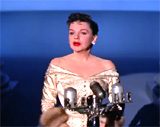
"Hello everybody - this is - Mrs. Norman
Maine"
|
- before a large audience at the Shrine Auditorium
in the film's unforgettable and poignant
ending, Vicki appeared in a spotlight as she delivered a closing, posthumous
tribute line to her deceased husband to honor him, as she proudly identified
herself: "Hello everybody - this is - Mrs. Norman Maine" -
there was a slight pause and silence, and then the audience stood
and burst into ecstatic applause - the camera pulled back slowly,
ending with a long shot of Esther smiling through her tears
|

Norman in Sunset Strip Club Watching Esther

"The Man That Got Away"

Norman Driving Esther Home
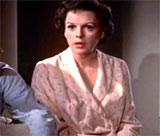
Esther (about Norman): "He saw something in me nobody else ever
did"
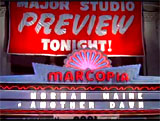
Studio Sneak Preview
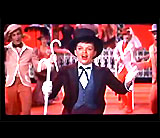
Vicki's Movie Preview Performance - A Prologue to an 18
Minute Production Number

"Born In a Trunk" -
The Opening and Closing Number in the Production
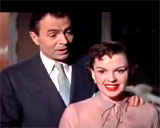
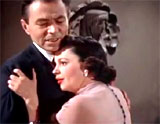
Norman to Esther/Vicki: "It's all yours!" Vicki Responded
About How It Wasn't Too Late for the Two of Them
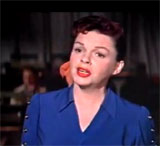
"Here's What I'm Here For"
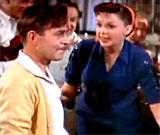
Norman's Marriage Proposal Caught on Audio
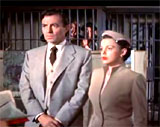
Private County Courthouse Marriage

"It's a New World"- Sung in a Cheap Motel
Room to Norman After Their Marriage
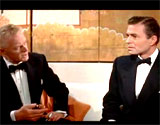
Norman Told That His Studio Contract Would Be Paid Off and End
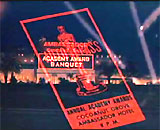
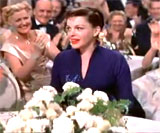


Norman's Drunken and Embarrassing Appearance at
the Academy Awards Ceremony Honoring Vicki
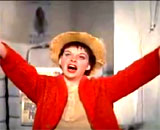
"Lose That Long Face"
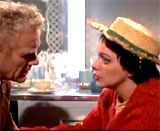
Vicki's Confessional Breakdown in Dressing Room to Studio
Head Oliver Niles (Charles Bickford)
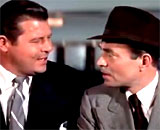
At the Racetrack Clubhouse with Libby
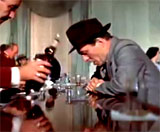
Norman Changing His Drink From Ginger Ale to a Double Scotch
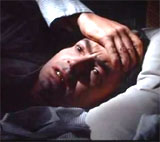
Self-Loathing Norman Overhearing Vicki's Conversation



Norman's Suicidal End
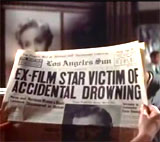
Headlines of Norman's Death
|




























